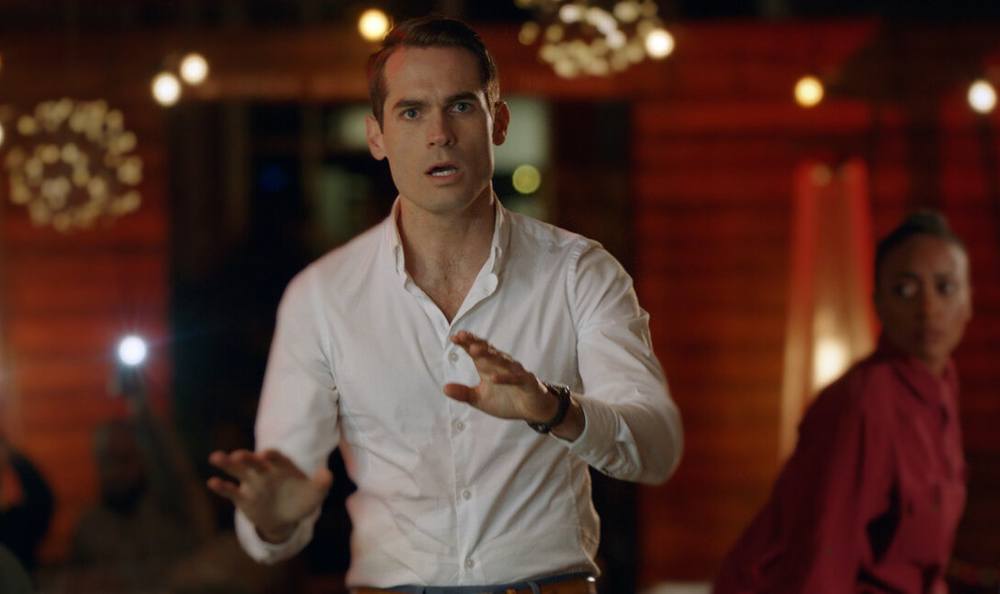Capsule reviews for Nov. 5

Jim Cummings stars in THE BETA TEST. (Photo: IFC Films)
Beans
Expressive newcomer Kiawentiio provides an emotional anchor for this poignant and provocative Canadian coming-of-age drama. The volatile true-life sociopolitical backdrop is a bitter and racially charged 1990 standoff over land rights involving the indigenous Mohawk tribe in Quebec. Beans (Kiawentiio) is a precocious 12-year-old who’s always obeyed her parents yet finds herself drawn to a rebellious group of older kids lured into the violence around them. The uneven screenplay by rookie director Tracey Deer portrays familiar themes through a unique cultural lens. Meanwhile, tension simmers beneath the surface of an insightful film that resonates with authenticity while retaining a sense of urgency in a divided world. (Not rated, 92 minutes).
The Beta Test
Both a cautionary tale about online privacy and a taut satire about infidelity in the #MeToo age, this character-driven saga is both harrowing and suspenseful. Jordan (Jim Cummings) is a stressed-out Hollywood agent who receives a mysterious solicitation for a one-time anonymous sexual encounter with no strings attached. After surrendering to temptation, Jordan’s relationship with his fiancée (Virginia Newcomb) becomes strained amid a downward spiral of obsession and paranoia. Led by an appropriately slimy performance by Cummings (Thunder Road), who shares screenwriting and directing credit with co-star P.J. McCabe, creates some intriguing character dynamics within the cutthroat world of Hollywood agencies. It’s exaggerated yet impactful. (Not rated, 93 minutes).
Gaza Mon Amour
Without delving too deeply into the tricky sociopolitical territory its backdrop suggests, this breezy romance instead is a mostly charming glimpse into life in contemporary Palestine. It follows a struggling 60-year-old fisherman (Salim Daw) who makes a surprising discovery during one of his expeditions on the water, which complicate a potential courtship with the young proprietor (Siam Abbas) of a nearby dress shop. While addressing the constant unease that Gaza residents endure, the uneven screenplay by sibling directors Arab and Tarzan Nasser is more focused on characters than politics. Despite some indulgences, the deadpan humor keeps the mood light while the performers generate an endearing chemistry. (Not rated, 87 minutes).
Hive
The effects of political unrest in postwar Kosovo are never shown but felt throughout this bittersweet and quietly perceptive story of healing and humanity in the face of tragedy. It centers on Fahrije (Yllka Gashi), whose hope is dwindling after her husband disappeared during the war years earlier. That’s left her to keep the family going by starting a food business with other women in town, despite patriarchal obstacles including the stubbornness of her elderly father-in-law (Cun Lajci). The multilayered screenplay by rookie director Blerta Basholli, based on true events, suffers from uneven narrative momentum yet gains strength through its unique cultural perspective and Fahrije’s determined resilience. (Not rated, 83 minutes).
Ida Red
Some intriguing ideas about loyalty and redemption are offset by the formulaic trappings of this crime thriller that squanders a strong cast and some well-crafted action sequences. Ida (Melissa Leo) is an incarcerated criminal who’s terminally ill and determined not to die behind bars. Her last hope at freedom involves an elaborate heist perpetrated by her son (Josh Hartnett) and nephew (Frank Grillo), who must determine whether perpetuating the family legacy is worth the personal cost. While exploring those moral complexities, the script by director John Swab (Run with the Hunted) lacks sufficient character depth and indulges in some final-act contrivances that diminish the emotional stakes. (Rated R, 110 minutes).
Love It Was Not
Forbidden romance at the height of World War II is only the starting point for this compelling documentary that finds another fascinating true-life angle for exploring the horrors of the Holocaust. Helena Citron was a Slovak prisoner at Auschwitz who began an affair with a Nazi officer. He shielded her from the brutality and saved her life, but also left Helena with a difficult choice when they crossed paths again years later. Even if the material isn’t traditionally cinematic, Israeli director Maya Sarfaty provides some insightful anecdotes through interviews both new and archived. The resulting straightforward effort smartly gives its remarkable source material a deserving spotlight. (Not rated, 86 minutes).
A Man Named Scott
It might be a hagiographic exercise in self-promotion, but this intimate documentary chronicling the career of hip-hop musician Kid Cudi also is illuminating into his creative inspiration and artistic process. As collaborators including Pharrell Williams and Kanye West rave about Cudi — the stage name of actor Scott Mescudi — in terms of his genre-bending vocal style and inspirational lyrics, the film is more powerful when it dissects his personal struggles with depression and addiction, and the burden of expectations. Playing like a confessional of sorts, the result is an introspective treat for devoted fans while offering a deep-dive into broader conflicts between art and commerce. (Not rated, 95 minutes).
Mark, Mary and Some Other People
After starting out as a clever and somewhat progressive spin on millennial relationships, this low-budget romantic comedy turns labored and predictable. Dog walker Mark (Ben Rosenfield) and aspiring rock star Mary (Hayley Law) are college acquaintances who fall for one another after a meet-cute years later, then get married. Mark is intrigued when Mary suggests an open marriage before the idea backfires following a pregnancy scare. The screenplay by director Hannah Marks (After Everything) features some big laughs but struggles to find much depth behind its quirks. Despite some appealing performances, the characters gradually lose our sympathy as their playful banter turns into nonstop bickering. (Not rated, 89 minutes).